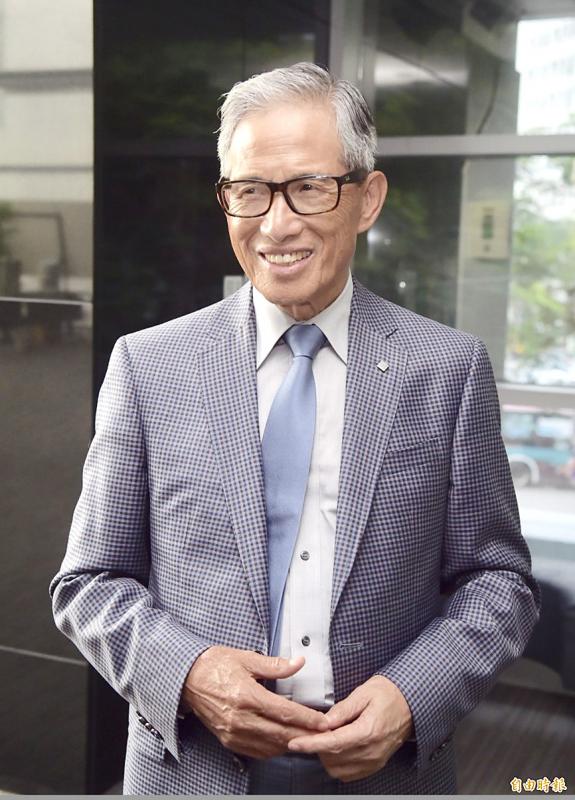Former minister of foreign affairs Francisco Ou (歐鴻鍊) has passed away, sources said yesterday. He was 81.
Sources from the Chinese Nationalist Party (KMT) said they learned from Ou’s family on Sunday that he had recently passed away. The sources did not disclose the date nor the cause of death out of respect for his family’s privacy.
KMT sources said that Ou had major surgery in August. His condition continued to deteriorate and he had been hospitalized before his family decided to end life support.

Photo: Lu Yi-hsuan, Taipei Times
Ou was accompanied by his family when he passed away in the hospital.
The Ministry of Foreign Affairs would not confirm Ou’s death out of respect to his family.
Ou served as the nation’s top diplomat from May 2008 to September 2009 under former president Ma Ying-jeou (馬英九) of the KMT.
Prior to becoming the minister of foreign affairs, Ou, who had served as a Spanish interpreter for the late presidents Chiang Kai-shek (蔣介石) and Chiang Ching-Kuo (蔣經國), had served in government in several diplomatic capacities during his 45-year diplomatic career, mostly with Spanish-speaking Central and South American nations.
Ou had served as ambassador in Nicaragua from 1984 to 1985; twice in Guatemala from 1990 to 1996, and again from 2003 to 2008; and in Spain from 2000 to 2003.
Ou resigned as the foreign minister on Sept. 10, 2009, along with outgoing premier Liu Chao-Shiuan (劉兆玄) and the rest of the Cabinet in Ma’s administration, mostly over the government’s slow response in handling the aftermath of Typhoon Morakot.
In retirement, Ou served as head of several non-governmental organizations promoting Taiwan’s foreign relations, and had frequently attended conferences organized by a KMT think tank.

POSITIVE DEVELOPMENT: Japan and the US are expected to hold in-depth discussions on Taiwan-related issues during the meeting next month, Japanese sources said The holding of a Japan-US leaders’ meeting ahead of US President Donald Trump’s visit to China is positive news for Taiwan, former Japan-Taiwan Exchange Association representative Hiroyasu Izumi said yesterday. After the Liberal Democratic Party’s landslide victory in Japan’s House of Representatives election, Japanese Prime Minister Sanae Takaichi is scheduled to visit the US next month, where she is to meet with Trump ahead of the US president’s planned visit to China from March 31 to April 2 for a meeting with Chinese President Xi Jinping (習近平). Japan and the US are expected to hold in-depth discussions on Taiwan-related issues during the

‘LIKE-MINDED PARTNER’: Tako van Popta said it would be inappropriate to delay signing the deal with Taiwan because of China, adding he would promote the issue Canadian senators have stressed Taiwan’s importance for international trade and expressed enthusiasm for ensuring the Taiwan-Canada trade cooperation framework agreement is implemented this year. Representative to Canada Harry Tseng (曾厚仁) in an interview with the Central News Agency (CNA) said he was increasingly uneasy about Ottawa’s delays in signing the agreement, especially as Ottawa has warmed toward Beijing. There are “no negotiations left. Not only [is it] initialed, we have three versions of the text ready: English, French and Mandarin,” Tseng said. “That tells you how close we are to the final signature.” Tseng said that he hoped Canadian Prime Minister Mark Carney

President William Lai (賴清德) yesterday bestowed one of Taiwan’s highest honors on Saint Vincent and the Grenadines (SVG) Ambassador Andrea Clare Bowman in recognition of her contributions to bilateral ties. “By conferring the Order of Brilliant Star with Grand Cordon on Ambassador Bowman today, I want to sincerely thank her, on behalf of the Taiwanese people, for her outstanding contribution to deepening diplomatic ties between Taiwan and SVG,” Lai said at a ceremony held at the Presidential Office in Taipei. He noted that Bowman became SVG’s first ambassador to Taiwan in 2019 and

A man walks past elementary school artworks at the Taipei Lantern Festival in Ximen District yesterday, the first day of the event. The festival is to run from 5pm to 10pm through March 15.